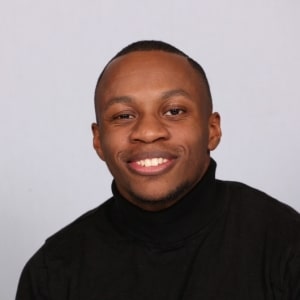I am a 2nd Year Neurotechnology PhD Student who is part of the Centre for Doctoral Training in Neurotechnology For Life and Health. Within this CDT, the emphasis is on developing technologies to deal with questions of the health of the brain, an organ that we still have so much to learn about. This can range from neurodevelopment to neurodegeneration to neurotrauma and neurorehabilitation.
My specific project looks at monitoring the brain when it is severely injured after a traumatic brain injury or stroke and patients are in neurocritical care. In the immediate term the issue for healthcare professionals is to stem bleeds and deal with the primary injury but secondary injuries can develop due to the spread of a wave known as a spreading depolarisation. This phenomenon is linked to worse outcomes for patients and I am making a combined sensor to monitor this and the effect on tissue health in the at-risk region.

It may sound cliché but literally every day and week for me is different. I work between two research groups: The BioMedical Sensors Group at Imperial, led by Professor Martyn Boutelle and the Bioelectronics Group led by Professor George Malliaras at the University of Cambridge. So, one day I’ll be in London, the next I’ll be in Cambridge doing fabrication and all things in between. No two days are the same which is really fun but also very challenging.
To be honest it has to be the people and places I have been exposed to as a result of this PhD. Meeting people from all over the world and being introduced to so many different cultures has been very enriching. Going stateside to present at conferences as well as being part of international projects in Denmark for example have opened me up to the wealth of opportunities that are available, and I would love for this continue. Research works best when it isn’t done in a vacuum. Collaboration and a global outlook excite me.

Definitely travelling between Cambridge and London and staying on top of everything else that I do – specifically my outreach, the African-Caribbean Research Collective and Black In Neuro. As the facilities for fabrication that allow me to progress with my project are based around 2 hours away from home, in Cambridge, I have to be highly organised to keep my project going at the right pace. This is hard, in addition to staying connected to both research groups, at times it can feel like you are at the fringes of both.

For me I love London, it has always signified home for me, so being at a major university in this city is somewhere I have always wanted to be. Regarding my university, I love Imperial’s global outlook and emphasis on translating research, something I feel it does better than most others. I also meet and work with people from all over the world and this is something I love about where I work.
I am a sports fanatic, so I love football, basketball, athletics, to be honest most sports. I support Manchester United and the Chicago Bulls. I love both playing and watching. I also love gaming, reading and travelling. Most importantly, I love spending time with my friends, catching up and exploring the city. There is always something to do in London.
Follow him on Instagram and Twitter and read his research papers using the links below. Also check out the BlackInNeuro Website, Twitter, YouTube and Instagram links below, which De-Shaine has been integral to, as well as the Twitter account of the African-Caribbean Research Collective:
Instagram | Twitter | Research Papers | BlackInNeuro Website, Twitter, YouTube & Instagram | African-Caribbean Research Collective Twitter

